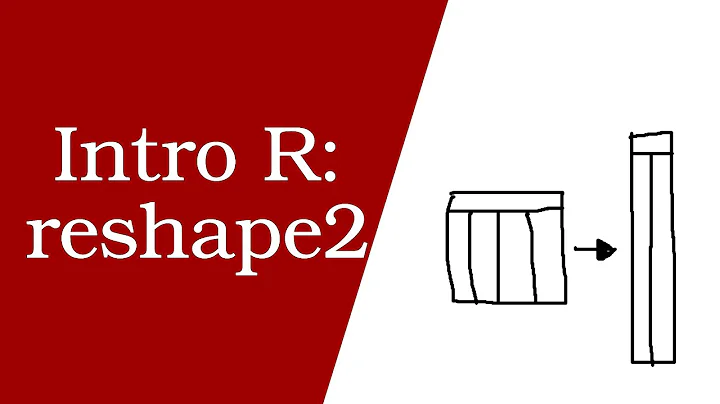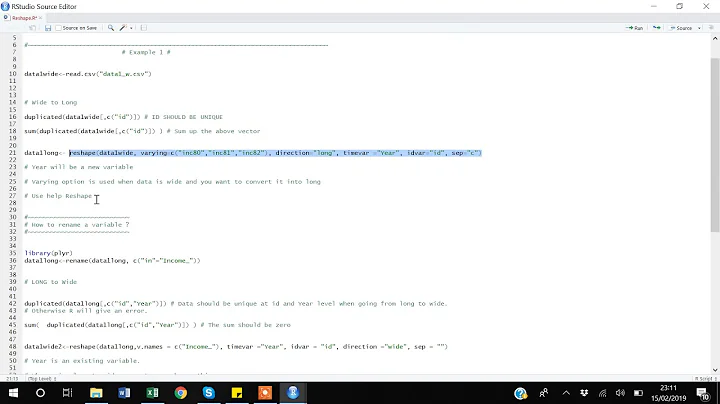How to use acast (reshape2) within a function in R?
Solution 1
Instead of using the formula specification, use the character specification:
acast(y, list(names(y)[1], names(y)[2]))
Solution 2
One issue is that you are abusing the formula notation in R. You shouldn't do things like
> acast(y, y[,1] ~ y[,2])
var1 var2 var3
1 2.1726117 0.6107264 0.291446236
2 0.4755095 -0.9340976 -0.443291873
3 -0.7099464 -1.2536334 0.001105352
as the 'y' bits are redundant if a data object is supplied. If you refer to the variables of y by name directly in the formula, things work nicely
> acast(y, id ~ variable)
var1 var2 var3
1 2.1726117 0.6107264 0.291446236
2 0.4755095 -0.9340976 -0.443291873
3 -0.7099464 -1.2536334 0.001105352
and the code is much more readable in this second version.
To do what you want using the acast wrapper is going to involve generating the correct formula using the names, as Joris points out, and Hadley's solution is much simpler. So my point really is to watch out with how you use formula specification in R. You'll save yourself a lot of trouble in the long run (though not specifically with this particular problem) if you use formulas properly.
Solution 3
Correction : problem is not that it doesn't find dat, but that it doesn't find dat[,v1] and dat[,v2] in the specified formula. Acast takes an argument of the type formula, and that one gets evaluated in a temporary environment created around your data frame. Within that environment, it doesn't find a "dat" object when the function is wrapped within another.
I'm not completely following as to how this does work in the global and doesn't when wrapped, but if you feed acast a formula, it does work within a function as well.
wrap.acast <- function(dat, v1 = 1, v2 = 2) {
x1 <- names(dat)[v1]
x2 <- names(dat)[v2]
form <- as.formula(paste(x1,"~",x2))
out <- acast(dat,form)
return(out)
}
using your toy data :
> wrap.acast(y)
var1 var2 var3
1 0.04095337 0.4044572 -0.4532233
2 1.23905358 1.2493187 0.7083557
3 0.72798307 0.7868746 1.7144811
Related videos on Youtube
Henrik
Assistent professor of psychology at the University of Warwick, UK. My primary programming language is R. I am maintainer of R packages afex, MPTinR, and acss. Besides R, I use Python (using PsychoPy) and JavaScript for running experiments and occasionally other languages. A list of my publications can be found on my homepage (usually with possibility to download the papers, data, and analysis scripts).
Updated on June 04, 2022Comments
-
Henrik almost 2 years
I tried to use
acastfromreshape2within a self written function, but had the problem that acast did not find the data I send to it.Here is my data:
library("reshape2") x <- data.frame(1:3, rnorm(3), rnorm(3), rnorm(3)) colnames(x) <- c("id", "var1", "var2", "var3") y <-melt(x, id = "id", measure = c("var1", "var2", "var3"))ythen looks like this:id variable value 1 1 var1 0.1560812 2 2 var1 1.0343844 3 3 var1 -1.4157728 4 1 var2 0.8808935 5 2 var2 0.1719239 6 3 var2 0.6723758 7 1 var3 -0.7589631 8 2 var3 1.1325995 9 3 var3 -1.5744876now I can cast it back via
acast:> acast(y,y[,1] ~ y[,2]) var1 var2 var3 1 0.1560812 0.8808935 -0.7589631 2 1.0343844 0.1719239 1.1325995 3 -1.4157728 0.6723758 -1.5744876However, when writing a small wrapper for
acastthat should do the same, i get a stupid error messages:wrap.acast <- function(dat, v1 = 1, v2 = 2) { out <- acast(dat, dat[,v1] ~ dat[,v2]) return(out) } wrap.acast(y) Error in eval(expr, envir, enclos) : object 'dat' not foundThe problem is obviously related to something like environments and global/local variables. As it gives other error messages after declaring
datin the global environment (i.e.,v1andv2not found as long as they aren't global).I would like to use resahpe (especially acast) within a function without the necessity of declaring the variables outside the function. What is the trick?
Thanks.
-
Joris Meys over 13 yearsAs you noticed yourself, the use of super assignments should be avoided at all times, unless you really want to make a global variable. And even then you might want to rethink the problem...
-
Henrik over 13 yearsThis is what I wanted. Thanks a lot.
-
Henrik over 13 yearsThat is even simpler. Many thanks. And even more thanks for providing reshape2 and all your great packages!







